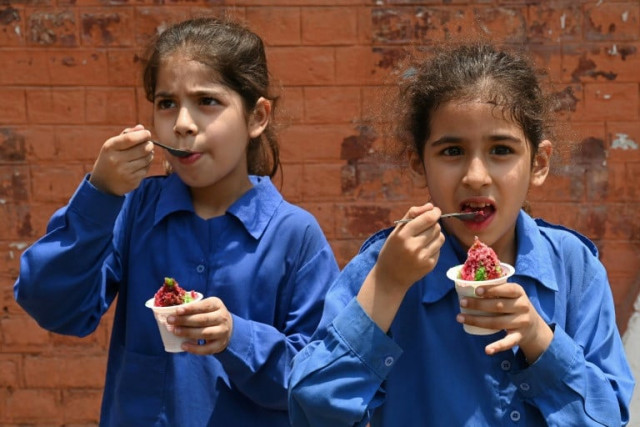Dadu, Mohenjo Daro, Jacobabad sizzle at 50°C
Heatwave cancels lessons for half country’s pupils

The scorching summer sun continued to bake upper Sindh areas on Thursday with the mercury shooting to 50 degrees Celsius in Jacobabad, the Pakistan Meteorological Department.
The hottest day in Jacobabad so far was experienced on May 27, 1998 when the mercury touched 51.9 degrees Celsius.
The met office said heatwave conditions are likely to prevail over most parts of the country during the next 24 hours. However, rain-windstorm/thunderstorm is expected at isolated places in upper Khyber Pakhtunkhwa, Pothohar region, Gilgit-Baltistan and Kashmir.
The highest maximum temperatures recorded were Dadu, Mohenjo Daro, Jacobabad (50°C), Rohri, Khairpur (49°C), Sibbi, Larkana, Shaheed Benazirabad, Sukkur, Padidan, Chhor, Mithi and Rahim Yar Khan (48°C), Khanpur, Kot Addu, Bhakkar, Noorpur Thal, DG Khan and Hyderabad (47°C).
Meanwhile, half of the country’s pupils will be shut out of schools for a week as the nation takes crisis measures to lessen the effect of a series of heatwaves, officials said Thursday.
Some 26 million students will be out of lessons from Saturday in Punjab, which has ordered schools to close for the summer break one week early because of the soaring temperatures.
The early closure was confirmed by a spokesperson for Punjab's Education Department.
The Pakistan Meteorological Department has forecast three heatwaves -- one already underway and two more set to hit in early and late June.
Temperatures in Punjab are currently six to eight degrees Celsius above normal, the National Disaster Management Authority said, with Lahore due for 46 degrees Celsius (111 degrees Fahrenheit) at the weekend.
The government's Coordinator on Climate Change and Environment told journalists in Islamabad on Thursday that “global warming is causing a sudden change in weather patterns”.
Parts of Pakistan are facing power cuts of up to 15 hours as demand for fans and air conditioning surges, leaving students sweltering at their desks.
Read more Heatwave claims life in Mirpurkhas
The Save the Children NGO said the 26 million schoolchildren in Punjab with lessons cancelled account for 52 per cent of pre-primary, primary and secondary students in Pakistan.
"Prolonged exposure to intense heat impacts children's ability to learn and to concentrate and this puts their education at risk," country director Muhammad Khuram Gondal said.
"Excess heat is also potentially lethal to children."
The UN children's agency UNICEF said more than three-quarters of children in South Asia -- or 460 million -- are exposed to temperatures above 35C (95F) for at least 83 days per year.
It warned that children are at risk of "dehydration, higher body temperature, rapid heartbeat, cramps... and coma".
Pakistan is responsible for less than one percent of global greenhouse gas emissions. However, the nation of 240 million ranks high among countries vulnerable to extreme weather events, which scientists have linked to climate change.
A third of Pakistan was submerged by unprecedented monsoon rains in 2022 that displaced millions of people. It was also battered by above-normal rainfall last month that killed at least 144 people in the wettest April recorded since 1961, with more deluges forecast this summer.
Lahore's students also saw lessons cut this winter when schools were shut as the megacity was enveloped by choking smog.
With additional input from AFP


1724319076-0/Untitled-design-(5)1724319076-0-208x130.webp)
















COMMENTS
Comments are moderated and generally will be posted if they are on-topic and not abusive.
For more information, please see our Comments FAQ